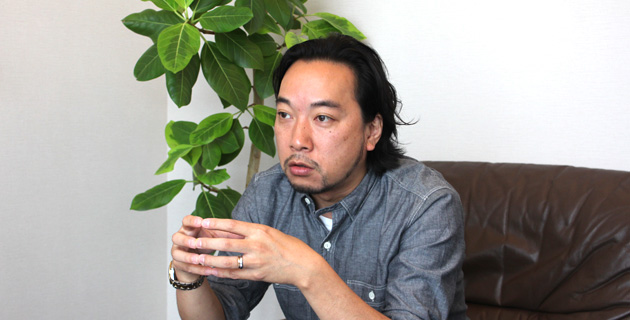
Interview: Designer Ko Kuwahata
Why did you become a designer for Yoshida & Co., Ltd.?
JAPANTWO(JP2): Why did you become a designer for Yoshida & Co., Ltd.?
Kuwahata (K): Most of our designers have been fans of Yoshida bags since the time they were students and began working for this company simply because they love our product. There are some who rely on connections to enter our company, while there are others who come back for application interviews again and again after previous unsuccessful attempts. But for me actually, I was never interested in becoming a "designer of Yoshida & Co., Ltd." One of my teachers from school knew, I think, the President of our company at that time… Back then, I wasn't interested in working in a company, thinking maybe I can work part time for a while and save some money to travel abroad, but I was told by my teacher that I should work for a company at least once in a lifetime and learn the rules of society and such. I didn't show up in classes much, and I was the kind of student that only did what I wanted to, but that teacher liked me for some reason. She told me that there is this one company that might take someone even like me so that I should go and get interviewed. So I did, and that company was Yoshida & Co., Ltd.
JP2: Mr. Kuwahata, you are currently in the corporate planning department, correct?
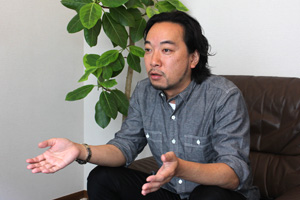
K: The corporate planning department was just inaugurated this year. Financing is not my thing at all, but I'm just simply digging down on things and networks that interest me. Our President has strengths in economics and good at financial management, with the ability to think about those kinds of things properly, while I'm the opposite and rely heavily on my senses. He is also kind in personality and nice towards his employees, but I am pretty severe. I tell and ask them how they feel about things that our President can't point out or just don't notice. During the 20 years after I began working for this company, we showed a remarkable growth in sales. Back when I just entered this company, we were more like a sole proprietor rather than a company and we didn't really have rules or anything. But the number of employees grew dramatically in about ten years and we started to have brilliant people come into our company, speaking in terms of their academic backgrounds as well. Within all that, there were a lot of things that we couldn't organize… although it is easier for me when things are unorganized. But these people who decided that they want to work for us have graduated their schools, have seen many other companies, and where companies stand socially and such, so I thought that they won't be able to work comfortably if we don't place them in an well maintained environment. So I was talking to our President and he asked me why not try it myself. According to his words, since you have been creating things all along, you should try creating people too, and then try creating the company. I guess it's like that, whatever I'm doing right now.
Do you have any particular rules when designing products?
JP2: Do you have any particular rules or something you can't ignore no matter what when designing products for Yoshida & Co., Ltd.?
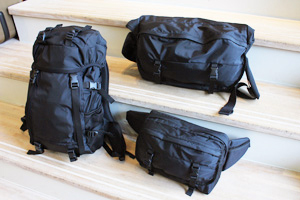
K: It's something I say to every staff; bags are tools that allow people to carry things, though it is a part of fashion for some women. Our supporters are mostly men, and for them, bags are something to carry their working tools. So, of course, the design and appearance is very important, but more than that, we put importance on aspects such as the durability and usefulness. Basically, "sacrificing the quality for to have an outstanding design" is an unnecessary concept in our company. To be honest, I almost never carry bags on holidays, and I think it is obvious that people feel less stressed with nothing in their hands. So I think that what is essential in bag making is to reduce the stress as much as possible. Still yet, there are things that can be separated. I think that it is also important to make bags that people could appreciate the design so much that it will make them be like, "I feel so much happier just by carrying this around," or "I think I can do well on this big presentation if I have this bag on me." Either way, I want to continue makings bags that will work as an asset for the users.
JP2: Is there a certain characteristic in the designs?
K: Not really, but I do tell the other designers that I don't want them to mimic designs of other companies. It is not a bad thing to look at other products and learn from it, but we, including myself, set it as a goal to be in the position of being mimicked. Being the second runner up, including in material development is frustrating. We might as well be in the first place and we also want to challenge ourselves for something new. On the other hand, though, I do think that our company is losing from it. Sometimes, we try to develop new material although we already know the material is risky for making bags at that time, and end up failing as we had expected. Then like three years later when the technology is more developed, other companies start making products with the same material. Also, some of them spend more money on advertisement rather than for material development. But the thing is, we get interviewed by the media because of the fact that we invest more on material development instead of spending on advertisement. I think this is what creating is really all about.
What is your goal as the designer of Yoshida & Co., Ltd.?
JP2: What is your goal as the designer of Yoshida & Co., Ltd.?
K: I don't have a goal for me, personally, but I would like to make new and interesting things that would keep the company going for ever. I also want to make products that will continue to be appreciated 10, 20 years from now. While I want for the younger designers to pursue on one specific thing, I also want them to have interest in many different things, which I guess is a difficult request. But if it's possible, I'd like to continue being a "made in Japan" company forever. Companies emphasizing the "made in Japan" label have increased recently, but I think that they are just companies that are taking advantage of it after they encountered a situation in which they couldn't continue production of big-lots abroad after the economic crisis and the earthquake and such. I say to them in my mind, "You abandoned the Japanese craftsmen before to invest in Chinese production." I think it is just violent how some companies just kept shifting to Vietnam, Indonesia, one country to another, after wages increased in China, and as soon as they saw chances for production of small-lots in Japan because of the deterioration in economy, they now start claiming the label of "made in Japan." The reasons why we are a "made in Japan" company is just the opposite; we don't have the courage to make investments abroad and we don't have the skills to communicate with the people of different cultures. I have to say that it takes quite a lot to communicate and insist on explaining the details of the work that has been put forth to someone of a different culture. What global companies like UNIQLO are doing right now, sending Japanese professionals to the production sites abroad and working things out, is actually very impressive. Our company, however, can't take on such a huge lot. This might sound weird, but I think it is important that we eat, drink, live the same lifestyle, and speak the same language in Japan. No matter how much we were to expand our business abroad, 80 to 90 % of our customers who allow us to keep going will still be those living in Japan. So then, we would want to make our products with the people who are closest to us. We are a "made in Japan" company, if you put it in a good way, but actually, we are "cannot but only make in Japan" company.
JP2: That, too, is a great thing.
K: Yes, it is. But that was just the way our founder saw things. We would like to continue that way as long as possible.
How do you integrate the differences in the opinions between the craftsmen and the designers?
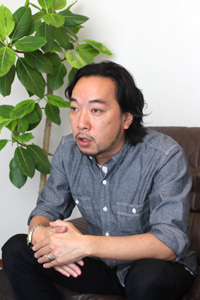
JP2: How do you integrate the differences in the opinions between the craftsmen and the designers?
K: Well, there are much more things we are capable of doing compared to the past… but there are still some gaps in between what we want and what they can do. There is nothing else we can do than to keep insisting. Some of our designers have studied bag making to an extent including sewing techniques; for instance, I can make a pattern for bags a little. Of course, we can't sew anything that's good enough for anyone to pay for, but there are some who has knowledge to some extent, and plus, anyone in our design team will have to study at least some things along with their career. So, they ask, "What if you do it like this? Then, can you do it?" When they get a reply saying that is not possible they keep on asking why. Eventually, we get answers which can be strange sometimes like, "Because I don't like that way of sewing." But for example , when the reason is something like, "If I sew it like that, I won't be able to make as much in a day," it is up to the designer to decide what to take. When we keep on pursuing the importance of balancing between the design and its durability, the craftsmen sometimes come up with a different compromise. So, it is really a matter of keeping the conversation ball rolling, and being able to do that is a part of what it takes to be a designer. Since time has been tough for the Japanese craftsmen for a while now, there are some who come to us and offer their skills to us. We appreciate these offers, but there are some among them who say that they can't do that much since it is so elaborate or have doubts in the necessity of doing so much. For example, some don't see a reason to sew a place three times where other companies would only sew once. But we insist, "Yes, there is a reason and you will understand once you do it." While some continue to decline our request, there are some who are convinced and will do it for us. Some people call this "standards of Yoshida."
Uematsu (YOSHIDA & CO., LTD. PR /U): In contrast, our young staff learn a lot from the craftsmen.
K: In that sense, it is tough on our young staff but it is easier for them to take in knowledge and much more fruitful. Occasionally, the craftsmen help them before they have to consider a matter.
U: The experience of a young staff is nowhere near close to that of a craftsman.
K: There is one thing that I tell to the young staff without experience. Don't just have the craftsmen help you, because if you keep doing that you won't be able to ask them to do things that you come up of. Don't be satisfied until you understand and agree with the reasons why it is that way and how it is done. It is never acceptable to say okay just because it is what the craftsmen have provided. Designers must understand the reasons behind it and see it in the context of their design. That is my intention of having them go and talk to the craftsmen until everything is fully understood. If they do so, the craftsmen will tell them and teach them. And from then on, designers will think for themselves before they ask, developing their own design instead of the craftsmen's design. The designers have to actually like design and manufacturing to work for us.
Do you have any special feelings towards "made in Japan?"
JP2: As a designer of Yoshida & Co., Ltd., do you have any special feelings towards "made in Japan?"
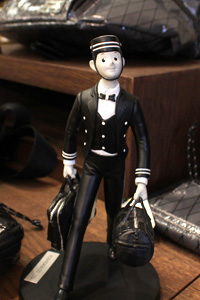
K: I think that Japanese are very dexterous, and it is up to the designer to make or break use of that trait. Designers do no good without people who turn the designs into shapes. Of course, it is a different case for those great designers of the world, but I don't think it is the same for us. For us, things work out only with the support of others like craftsmen and those who provide us with the materials. We provide merely a part of all the work and effort that is put into the product. Designers have the tendency to receive more attention, but as a matter of fact, we only contribute to about 30% of what it takes to make a bag. The rest goes to the craftsmen who provide us the material, sew the material together, and the people who sell them, which makes it all work out. I tell some of the designers who come from art schools that this is not an art piece. We are not artists, our products are not art, and we need to have people to purchase it. As long as they understand that, I don't mind them doing things freely to some level.
U: Our Company insists on being a bag maker. We are often asked if we are ever going to produce apparel , or any other product in a different category, but neither do I, nor the President, experiment with those things. All of our designers are always thinking about the meaning of manufacturing bags as Yoshida products. No matter how outstanding the design is, if it is not durable, and does not fulfill its requirements, it cannot be put into production. But you can also say the opposite; for instance, if it is a briefcase made of high quality leather that would make you want to use it on your big day, we choose not to attach a shoulder strap if it looks better without it despite its usefulness. Making our products look as stylish as possible is one of the appeals, so we have to make choices according to the concepts of the designs and the situations in which they will be used.
Why Porter is popular to those people living overseas?
JP2: What do you think is the reason why Porter is popular not only to the foreign national living in Japan but also to those people living overseas? What aspects do you think are appreciated?
K: I go abroad for work often, and I think that it is because there aren't so many companies that stand in the same position. In Japan, there are companies that we can tell that are using Yoshida & Co., Ltd. as their business model, but in Hong Kong, the market is dominated by luxury brands, when it comes to bags. We are at a whole different position compared to them. And of course, there are also very reasonable products, including the counterfeited versions of our products. In Asia, I think that Japanese products are one of the things that are admired. Plus, I guess it makes it more accessible for people, since we are able to introduce and explain our company's history and philosophy clearly.
U: Since we have had a head start in collaborating with other fields of industries from the 90s, there might also be people who didn't have an interest in bags but learned about us through collaboration items. We have been collaborating and developing products with industries that are well known in their field, such as cases for computers, cameras, and cell-phones, so it has been great opportunities for more people to get to know about us.
K: A lot of companies take a high profit ratio to their products and spend more on advertising, but we do not prefer that strategy, so we barely do any advertising. That is why collaborating with well known companies lead to the advertising of our company. When I went to Hong Kong last September, I thought that if there is this much demand, it might be necessary to begin developing business to respond to it. Especially the size; I have been told by an American and a journalist of abroad that they like Yoshida bags, but they are too small for them. I think that we may need to start thinking about making bags for those people in the future, keeping up to date with each of their cultures and lifestyles.
A Message for fans
JP2: To wrap it up, please give a message to the fans of Yoshida bags abroad, and to future Yoshida fans.
K: To those who have already purchased our products; we will keep on trying to experiment on new things and maintain your trust with our constant quality and ideas. We will work harder to try to understand each land and lifestyles of our customers to provide what will be best for them. Also, for those who found interest in our products from such endeavors, we hope it leads to them feeling glad that they bought our products, and also being anxious to see what we will come up with next. We will put forth our maximum effort to create products that will make you feel that way. Don't miss it!
Website http://www.yoshidakaban.com/
